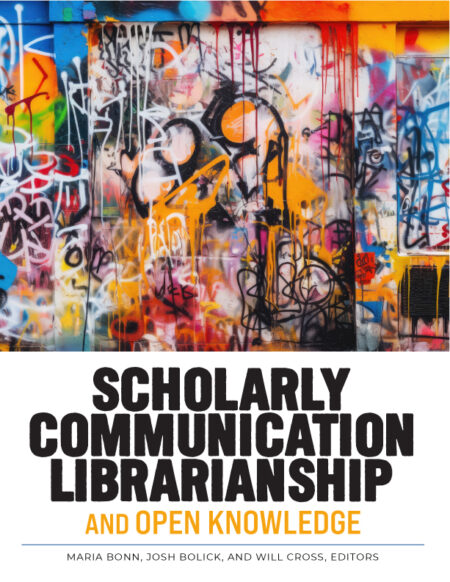The OER+SC project team of Maria, Will, and Josh, with an incredible group of section editors and contributors, have developed an openly-licensed introduction to our profession. Scholarly Communication Librarianship and Open Knowledge (ACRL, 2023) was conceived as an open textbook of scholarly communication librarianship, which we hope may be a vehicle to increase instruction on SC topics in LIS programs, as well as serve as a resource for continuing education. The idea of the book was the cornerstone of our initial collaboration, and we’ve discussed it with many valued colleagues and mentors (whose feedback helped to shape it), so it’s very exciting that it finally exists. We also created a complement to the book, the Scholarly Communication Notebook (SCN). If the relationship between the book and the SCN isn’t clear, here’s a reflection on that.

The book (open version, PDF) consists of three Parts. Part 1 defines scholarly communication and scholarly communication librarianship, and provides an introduction to the social, economic, technological, and political/legal backgrounds that underpin and shape scholarly communication work in libraries. Part 2 begins with an introduction to “open”, broadly conceived. We’re privileged to collaborate with four amazing section editors, who developed sections on different permutations and practices of open (access, data, education, and science/infrastructure). Part 3 consists of twenty five concise perspectives, intersections, and case studies from practicing librarians and closely related stakeholders, which we hope will stimulate discussion and reflection on theory and implications for practice. A CFP for Part 3 was issued in November 2019, and closed in mid-January 2020. For an early overview of outcomes, see “Voices from the Field” CFP Results. We are very proud of the resulting work and the incredible group of peers that helped to create it!
Here’s the Table of Contents.
Scholarly Communication Librarianship and Open Knowledge was the subject of a five-part discussion series hosted by the Medical Library Association Scholarly Communication Caucus in Fall 2024. It has been favorably reviewed in the Journal of Librarianship & Scholarly Communication, College & Research Libraries, the Journal of Web Librarianship, Library Resources & Technical Services, the Journal of the Australian Library and Information Association, and the Journal of New Librarianship.
We hope this text will provide a foundation for LIS courses that center scholarly communication topics, or supplement other curricular areas as they intersect with scholarly communication. We have a short list of LIS instructors who are using it starting in Fall 2023, and we’re eager to learn from their experience (and that of their students).
Please contact us if you have questions or suggestions. If you’re using the book, we’d love to hear from you!
